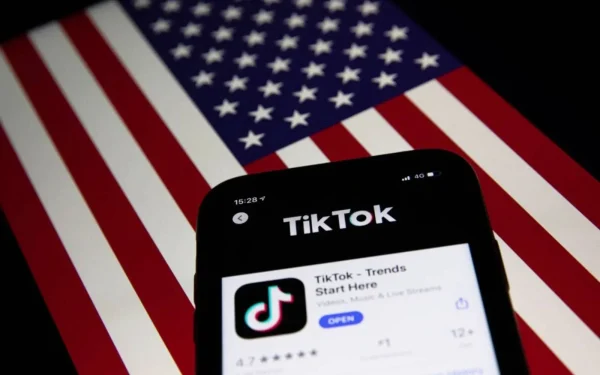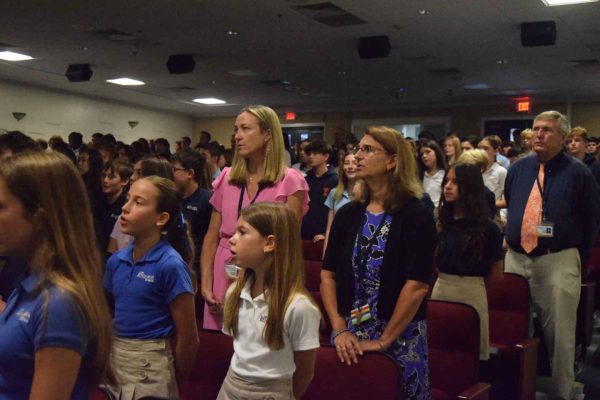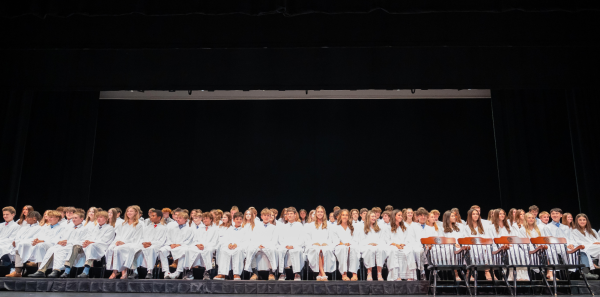What We Can Learn from the Baltimore Riots
AP Photo/Patrick Semansky – washingtontimes.com
A demonstrator raises his fist amidst the fires in Baltimore’s streets while police stand guard.
What is a civil right? According to Head of Middle School and seventh grade history teacher Mr. Charles Hagy, civil rights, “. . . in America [are] really simple [as said by our founding fathers]: We hold these truths to be self evident that all men are created equal. That they are endowed by their creator with certain unalienable rights that among these are: Life, Liberty, and The Pursuit of Happiness.” Mr. Hagy also said that, “[Civil rights start] with justice, and fairness under the law.” However, it is not just in history that we learn about civil rights. Civil rights still surround us in the world today.
On April 12, 2015, a young 25-year old African-American man was arrested for illegal possession of a switchblade in Baltimore, Maryland. This man, Freddie Gray, later suffered injuries while being transported in the police vehicle to the precinct. At some point between driving to the precinct and arriving there, Gray was injured. According to an article by David A. Graham in The Atlantic, Gray’s suffered three fractured vertebrae and a crushed voice box, injurious usually caused by serious car accidents. However, the six arresting officers denied the use of force in arresting or transporting Gray.
Mr. Gray died a week later from his injuries. As most are aware, riots have broken out in Baltimore as a result of Gray’s death, many of whom would say it was unnecessary. There have been media reports that claimed Gray’s death was the result of a “rough ride,” where handcuffed suspects are not seatbelted into an erratically driven vehicle. A state of emergency, as well as a curfew, have been mandated by the city’s authorities. Gray had a criminal record in the past for mostly minor offenses such as drug possession. He was also sentenced to four years in prison in 2009 for two counts of drug possession with intent to deliver. However, he got off early on parole in 2011. He had also been involved in 20 criminal court cases involving minor offenses similar to these. Despite his past, Gray still had his rights and the question is, were these rights denied or abused?
The irony of this situation is that students here at TBS, specifically those in the seventh grade, are currently studying civil rights and what it means. The seventh grade class was assigned to pick a moment in the Civil Rights Movement and recreate it. Students were assigned to write a three-act play, depicting the causes of the event, the actual event, and the effects of the event. In addition, students worked with artists from the Center for Creative Education to develop works of art which symbolized their chosen moment in the Civil Rights Movement.
“It is our goal as teachers, Mr. Mullnix and [I], to really educate kids,” explained Mr. Hagy. “To get kids to discuss what their civil rights are, what their natural rights are. To understand how to protect those rights in the future…I would like students to be more discerning and to look a little deeper and try to understand the root [of the] problem. To really ask why is this occurring?” However, if we are to discuss civil rights, we must take a step back to the 1960s Civil Rights Movement, or even the 1860s during the Civil War. In these times, segregation was a part of life. There was no moral conflict. But even now, this issue of race and gender equality is relevant in our modern society.
So how does all of this relate to The Benjamin School and its curriculum? Well, seventh- grade students have been immersing themselves in the topic of civil rights in both English and history classes. “What’s happening in Baltimore relates to the civil rights project we are doing in history because many people believe that [Gray’s] civil rights were violated, and in history we are talking about that,” explained seventh grader Alexandra Denholtz. “Our history project is about the [ 1960s] Civil Rights Movement.”
But the project has a deeper meaning that has also been a theme throughout the year with regard to the seventh-grade history curriculum. “It’s all about taking care of each other,” Hagy explained. “I think it starts there. I think it starts with equality. I think it starts with justice and fairness under the law.” Mr. Hagy’s point is that issues such as the Freddie Gray controversy don’t need to happen. We must treat each other kindly and look out for each other. Not only that, though, we cannot just assume things. We have to look deeper when it comes to people and circumstances and find out who they really are, try to understand them, and understand the situations in which we find ourselves.
“So that’s the connection to understand – to not assume that what’s going on in Baltimore is just riots by people out of control,” added Hagy. As for insight into what actually happened that night, Mr. Hagy admitted there is no real answer quite just yet. “In our system of justice. . .I don’t think we can decide-because everyone’s innocent until proven guilty. I think a trial has to occur before we can determine just how [Freddie Gray’s] civil rights were violated. I don’t defend [the officers’] behavior. I think their behavior was completely unacceptable. But you’ve got to look at the core issue…people in politics all across the country are trying to figure out how we can do this better.”
And it is that statement that Mr. Hagy wants to drive home and that he hopes is the overarching message at TBS. “If you only remember one thing, it’s that we’ve got to take care of one another,” noted Mr. Hagy. “Hopefully when you see an injustice in the world, you’ll speak up and you’ll want to do something about it.” Being kind and caring for one another is the first step to ensuring that things like the Freddie Gray case and other horrifying events in our history – slavery, the Holocaust, etc. – do not happen. Is it wishful thinking? Sure, but it has to start somewhere, and teaching students about the hard lessons of history at Benjamin and schools across the country is as good a place to start as any.





